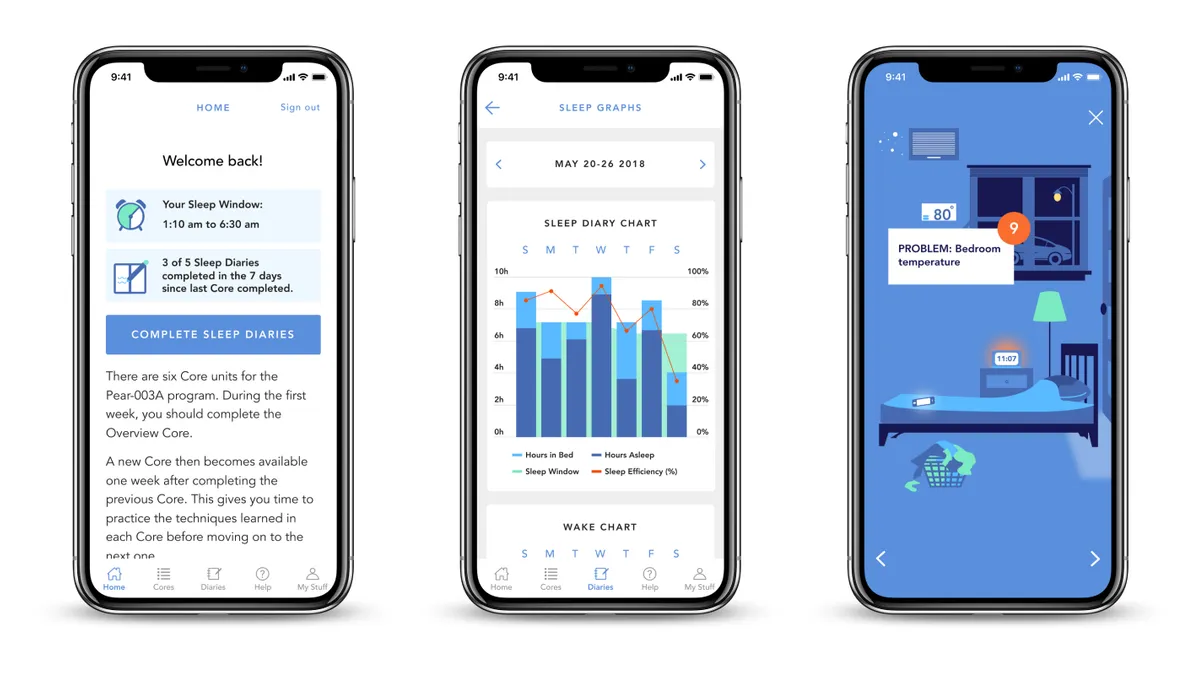Dive Brief:
- Pear Therapeutics' app-based treatment for chronic insomnia has received FDA clearance, the digital therapeutics developer announced Thursday.
- The company touted the product, dubbed Somryst, as the first to be submitted through the 510(k) pathway while also being reviewed as part of FDA's Digital Health Software Precertification Pilot Program, in which Pear is one of nine participants.
- It will be the privately held, Boston-based company's third digital therapeutic on the market, following FDA clearances in 2017 and 2018 for digital treatments for substance and opioid use disorders. Pear has nearly a dozen other products in its pipeline, including potential treatments for schizophrenia and multiple sclerosis it's working on with Novartis.
Dive Insight:
The product, which Pear expects to start rolling out in the third quarter, has the potential to reach a much broader patient group than its first two. The American Academy of Sleep Medicine estimates around 10% of the population suffers from chronic insomnia.
Pear said its submission of the cognitive behavioral therapy treatment, first announced a little over eight months ago, was backed by two randomized controlled trials published in JAMA Psychiatry and Lancet Psychiatry that altogether evaluated more than 1,400 adults with chronic insomnia. The nine-week prescription treatment is indicated for people 22 years of age and older. The company did not specify pricing.
The submission to FDA followed a so-called excellence appraisal of the company last May, a pillar of the Pre-Cert program in which FDA evaluates companies' principles on patient safety, product quality, clinical and cybersecurity responsibility, and "proactive culture."
Pre-Cert was conceptualized to eventually allow for more efficient adaptation of software as a medical device (SaMD) products, wherein product safety is maintained by certifying a technology developer and its practices rather that individual devices themselves.
The pilot the agency launched last year remains a work in progress. Bakul Patel, associate center director for digital health at FDA, recently told MedTech Dive the agency will continue to "test and build" the program this year, and will ultimately need to go to Congress to ask for the legislative authority for a finalized version of the program.
Meanwhile, Pear has also been scouting new prospects for its portfolio, many of which also employ cognitive behavioral therapy.
In January, the company announced it acquired a pair of clinical-stage digital therapeutics targeting acute and chronic pain from virtual reality product developer Firsthand Technology.
Pear also licensed technology from Sweden's Karolinska Institute aimed at treating irritable bowel syndrome, and the two plan to develop products targeting gastrointestinal and autoimmune disorders. Concurrently, the company announced it licensed a clinical-stage digital therapeutic to treat migraines from Cincinnati Children’s Hospital Medical Center.
Pear is venturing into voice technology as well, having licensed machine learning-based voice digital biomarkers from Canadian company Winterlight Labs that are meant to assess cognitive health. Pear said it did so in order to "develop and clinically validate digital biomarkers for a variety of diseases, including Alzheimer’s disease, depression, insomnia, schizophrenia, opioid use disorder, and substance use disorder."











